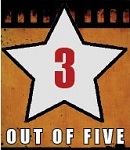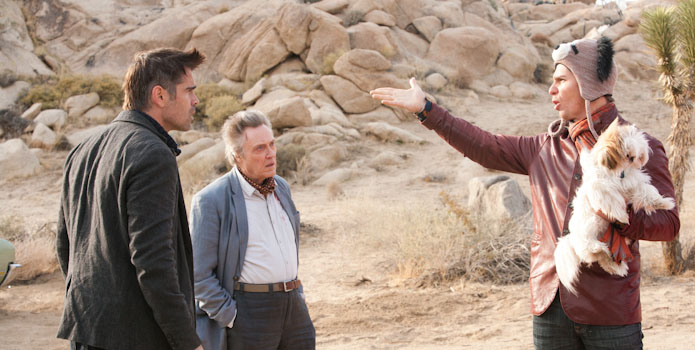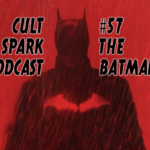
There's a sequence near the two-third mark of Seven Psychopaths that perfectly captures the kind of meta, bloody delirium I think writer/director Martin McDonagh was aiming for in his follow-up to In Bruges. It consists of an epic graveyard shootout, one that doesn't even occur in the reality of the film itself but rather in the mind of one of the film's characters as he lays out a possible ending to a screenplay that serves as one of the movie's plot points. (Got that? If not, this twisty story is only going to make you feel even more lost.) Anyway, the whole sequence is gory, over-the-top fun, filled with amusing one-liners, buckets of blood and sly commentary on the genre of the very film you're watching.
Unfortunately, McDonagh has problems maintaining that level of giddy madness over the course of the entire film. There's no doubt that Seven Psychopaths is fun to watch, but those hoping McDonagh would build off the success of In Bruges and turn in something that reaches Tarantino-level heights may walk out of the theater disappointed. This movie is bigger, broader and crazier than In Bruges, but it's not better. Indeed, it helps illuminate the fact that the simplicity of McDonagh's first film may be one of its biggest assets.
In Seven Psychopaths, Colin Farrell plays Marty, a struggling, alcoholic writer with a great title for a screenplay — also "Seven Psychopaths" — but no story to go with it. He finds not-entirely-welcome inspiration, however, when a dog-napping heist pulled by his best friend Billy (Sam Rockwell) and Billy's partner Hans (Christopher Walken) goes horribly wrong. You see, they nabbed the mutt of a hot-headed L.A. gangster (Woody Harrelson), and, before long, everyone's lives are in the hands of more than one violent wackjob, resulting in the bleeding together of Marty's everyday life and his printed pages.
Whatever problems one has with this film certainly don't fall at the feet of the actors. They're all great. Farrell proves once again that McDonagh knows how to use him better than anyone else. The crazier Rockwell's character gets, the more hilarious his performance becomes. And Walken wears a role seemingly tailored for him like a fine suit. There's a long stretch of uninterrupted dialogue he delivers near the movie's end that may not equal the watch speech from Pulp Fiction but does remind you to appreciate one of the industry's most singular performers. For these guys alone, the movie is worth a watch.
But it's also too sprawling, too unfocused and often not as clever as McDonagh likely thinks it is. There are shocking plot twists that don't enhance the movie so much as they send it off spiraling in some other direction, never to regain course. Because Seven Psychopaths is built to be a kind of send-up of violent, pop-culture-infused gangster films, it has this odd self-defense mechanism that makes it tricky to critique. Characters in this film do insanely dumb things, but that's because characters in this type of movie always do insanely dumb things. The female characters all suck. They're here just to look good and sometimes get killed, yet that's supposed to be okay because McDonagh acknowledges this by having Hans offer the exact same criticism of Marty's screenplay. Does the fact that the movie winks at these shortcomings and uses them for its own self-referential purposes make them any less applicable? I don't think so.
Whereas In Bruges explored the headier subjects of dealing with guilt and maintaining honor in the midst of chaos, Seven Psychopaths is happy to just bring you the chaos and plenty of it. And that's fine. There's no doubt McDonagh blends his own unique brand of bedlam. (Say that three times fast.) But so much of it seems like surface-level anarchy here, rather than the total deconstruction of movie-making itself that McDonagh may have had in mind.












